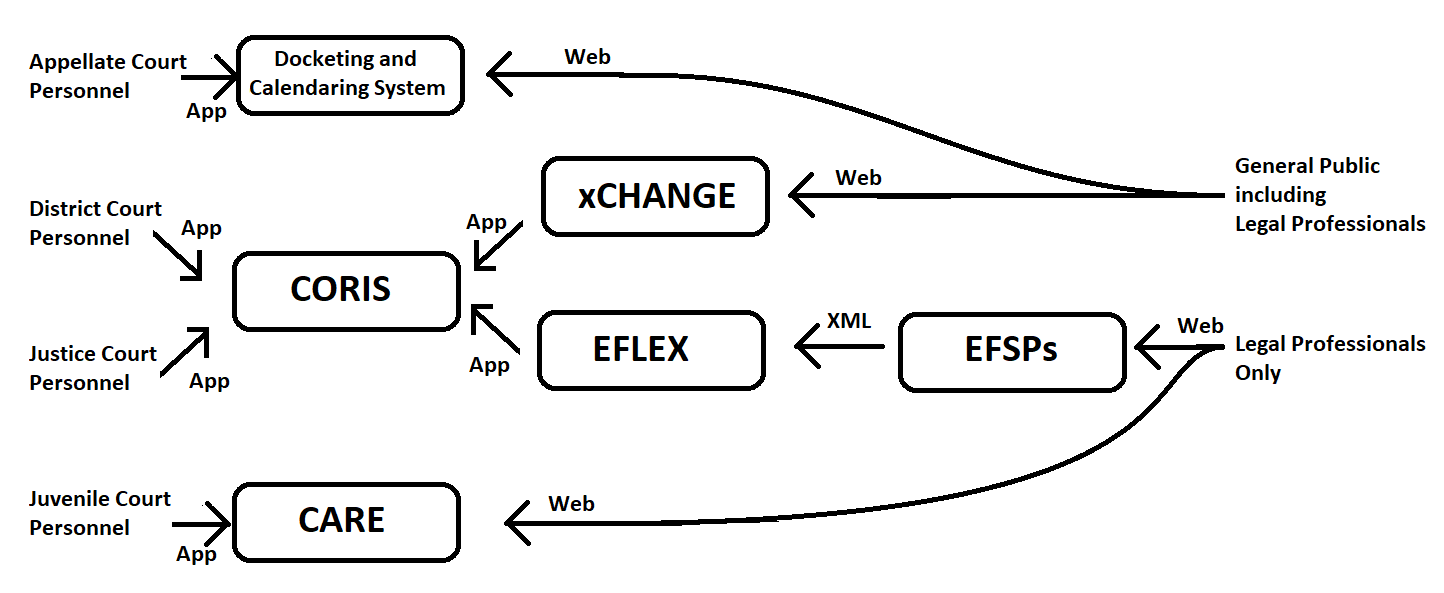| JudiciaLink | ||
| Legal Filing Solutions for the Utah State Courts. |

CORIS (Courts Information System) is the name of software that forms the backbone of Utah's District and Justice Court Records. Before 1995, various courts had set up computer systems, but between 1995 and 1998, all the courts statewide transitioned to using CORIS to manage their cases.
CARE (Courts and Agencies Records Exchange) is the name of the software that forms the backbone of Utah's Juvenile Courts. Created in 2002, it was in use by all juvenile courts by 2005. The appellate courts also set up calendaring and docketing systems, unconnected with CORIS or CARE.
XCHANGE, an internet service for members of the public, was set up along with CORIS, to allow people to access case information maintained in CORIS. Before 2009, only case searches and docket reports were available through xChange, but between 2009 and 2010, when the courts began regularly scanning files into CORIS, XCHANGE also began allowing document downloads. When e-filing was introduced, it was decided that private e-filing providers, not xChange, would be able to file documents, but XCHANGE would retain certain exclusive rights. E-filing providers could get docket and document information only on behalf of an attorney of record in the case, and could file documents. XCHANGE would allow case searches and provide docket information and downloads to the public for non-private cases.
E-FILING was first made available in District and Justice Courts in 2010, and all district and justice courts were added by 2014. The courts integrated CORIS with a third party software called EFLEX that allows private e-filing services providers (EFSPs) to make certain queries, encoded in XML, to file documents, download documents, get case history information, and update attorney profiles. The EFSPs would then provide an interface to attorneys to e-file. Judicialink became a certified EFSP in late 2012. Like other EFSPs, it communicates with the courts in XML at the access points set up for EFLEX.
In April 2013, e-filing became mandatory in district courts for all attorneys in all cases except Domestic, Probate, and Criminal cases (e-filing became mandatory for those case types over the next few years). Pro se parties, unlike attorneys, were neither required nor permitted to e-file, and that is still the case. In 2015, the CARE system was modified to allow e-filing in the Juvenile Courts (not using EFLEX). EFSPs were not given the ability to file in the CARE system and have also not been given the ability file with the appellate courts. When the Licensed Paralegal Practitioner (LPP) profession was created in 2019, LPPs were issued bar numbers and are able to use the e-filing system like attorneys.
REFERENCES:
1. Court's e-filing page: https://www.utcourts.gov/efiling
2. Judicial Council History 1973-1997: https://www.utcourts.gov/content/dam/knowcts/adm/docs/Judicial_Council_History-1973-1997.pdf
3. Judicial Council History 1998-2010: https://www.utcourts.gov/content/dam/knowcts/adm/docs/Judicial_Council_History-1998-2010.pdf
Copyright (c) Judicialink LLC. All rights reserved.
Judicialink LLC ("Judicialink") is a private business dedicated to providing electronic data processing and communications. Judicialink is not a court nor a government agency. Its sole relationship with the court is to facilitate electronic communications between individuals and the court. None of the content of this site is to be construed as legal advice, nor to create an attorney-client relationship. Judicialink is a limited liability company duly organized under the laws of the State of Utah. Pursuant to state law, no organizer, member, manager, or employee of Judicialink is personally liable under a judgment, decree, or order of a court, or in any other manner, for a debt, obligation, or liability of the company or for the acts or omissions of the company or of any other organizer, member, manager, or employee of Judicialink.